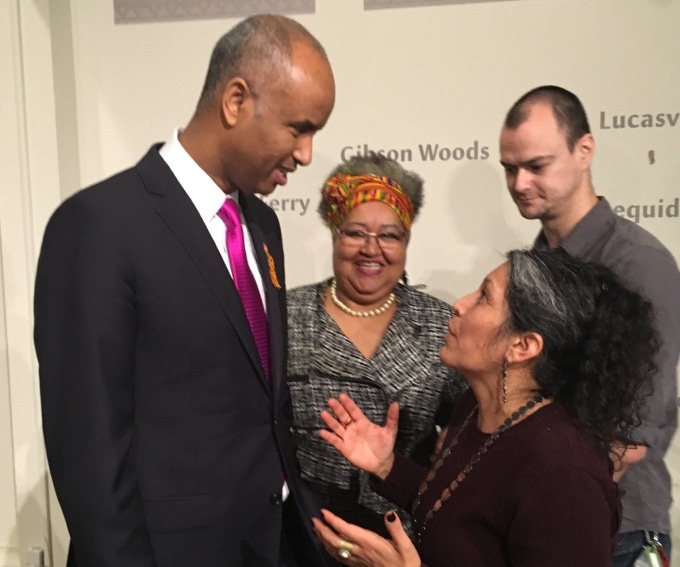
KJIPUKTUK (Halifax) – Today, I wish to have a face to face moment with the Honorable Minister Ahmed Hussen to talk with him about the Global Compact on Immigration. More specifically, my message is about Canada’s new commitment as a signatory of this Global Compact to address “the adverse drivers and structural factors that hinder people from building and maintaining sustainable” and peaceful livelihoods in their countries of origin. Factors that compel them to seek a future in Western countries.
But my message is also to Minister of Foreign affairs, the Honorable Chrystia Freeland, and to Darren Fisher, Member of Parliament representing the riding where I live.
Today, addressing Canada’s new commitment is timely in the context of Guatemala. The country where I was born.
Guatemala urgently needs the continuous support from the Canadian government for the UN sponsored International Commission Against Impunity (Spanish initials CICIG).
This UN-sponsored body has been assisting key institutions of the State of Guatemala to establish mechanism to effectively combat impunity, corruption, and to protect human rights.
But on Monday January 7, President Jimmy Morales unilaterally and unconstitutionally declared the agreement to be terminated and gave all CICIG officials twenty-four hours to leave the country. António Guterres, the UN Secretary-General, strongly rejected the summary closure of CICIG.
While acknowledging that a two-way trade with Guatemala is $832 million, Minister Chrystia Freeland has offered a statement indicating that “Canada is deeply disappointed with the Guatemalan government’s announcement”.
Guatemala needs Canada to continue publicly condemning Guatemalan’s President Morales’s recent decision to expel this UN-sponsored body. And to condemn Morales and his supporters’ recent actions to undermine the rule of law by seeking the impeachment of three of the magistrates of the Constitutional Court who ruled his action unconstitutional.
Guatemala is regarded as one of Latin America’s most corrupt countries. Impunity and corruption have been major barriers to social and economic progress and progress on justice issues including those stemming from the 36-year internal armed conflict and genocide against the indigenous people.
Since 2006, the CICIG has been a key actor in the struggle against corruption and impunity in Guatemala.
Yet, this experiment in fighting corruption is under attack.
Morales’s decision is the continuation of a series of attempts by the president and his supporters to stop the fight against corruption, reduce freedom of expression and constrain civil society organization in Guatemala.
In August 2018, President Morales announced that he would not renew CICIG’s mandate, effectively giving it until September 2019 when its mandate ends.
President Morales and his family are subject to multiple corruption investigations. He has been investigated and accused by CICIG of illicit campaign contributions. His brother Samuel Morales and his son Jose Manuel Morales have also been investigated and accused of defrauding the national property registry.
Ivan Velasquez, a Colombian prosecutor appointed by the UN, has led a team of international and Guatemalan investigators who have exposed a series of multimillion-dollar corruption schemes involving elected officials, businesspeople and bureaucrats. One of these led to the resignation, arrest, and trial of former president Oscar Peres Molina and his vice president Roxana Baldetti who now face fraud and corruption charges.
CICIG has supported Guatemala’s Public Prosecutor’s office and has also contributed to the strengthening of the Guatemalan judiciary through the creation of so-called high-risk courts.
In addition to high level corruption and organized crime cases, these courts enabled a series of high-profile prosecution of retired military leaders, including the late former military dictator Efrain Rios Montt, for crimes committed during Guatemala’s civil conflict and genocide.
The pioneering anti-corruption work of the UN-backed Commission against impunity is now at risk and it will have serious implications for stability in Central America.
President Morales has defied Guatemala’s highest court to terminate the UN agreement in order to shut down a number of investigations provoking a constitutional crisis.
Guatemala analysists are calling this crisis a “slow-motion-coup” which could have dire implications for combating corruption with ripple effects beyond Guatemalan’s borders.
For the past six months we have witnessed the mass movement of migrants from the Northern Triangle in Central America. Among them are hundreds of Guatemalan families, newborns, children, pregnant women, women, men, male and female youth, LGBTQ2SIA+ escaping life-or-death situations as much as poverty. Rather than dying of hunger, violence, land displacement and repression in Guatemala, they take the risks and brave the perils of the journey north in hopes to give their loved ones a chance to live, and maybe a chance to live well. They carry with them a myriad of stories: the killing of a loved one; a death threat over an outstanding extortion payment; an attempt at gang recruitment; a rape; harassment by a police officer; and hunger. Their lives intricately connected to the internal armed conflict and genocide during the 70s and 80s.
Canada’s immigration policy must support those in Guatemala who are forced to flee and rescind the Safe Third Country Agreement between Canada and the United States.
Canada’s foreign and immigration policy must support those in Guatemala who are struggling to maintain the rule of law. It must demand that the UN-backed anti-impunity commission be allowed to continue its work. It must support the transparency in this year’s election. Otherwise, we will contribute and witness a new mafia-backed dictatorship in Guatemala. This will create problems that no south of the border wall in the US or Canada can solve. Not that I believe that walls solve problems.
Note: this article contains extensive footnotes which WordPress cannot reflect. Click here to see the footnoted version in PDF format.
With a special thanks to our generous donors who make publication of the Nova Scotia Advocate possible.
Subscribe to the Nova Scotia Advocate weekly digest and never miss an article again.



